 |
| Nobu KL |
 |
| Appetizers |
 |
| Nobu KL |
 |
| Appetizers |
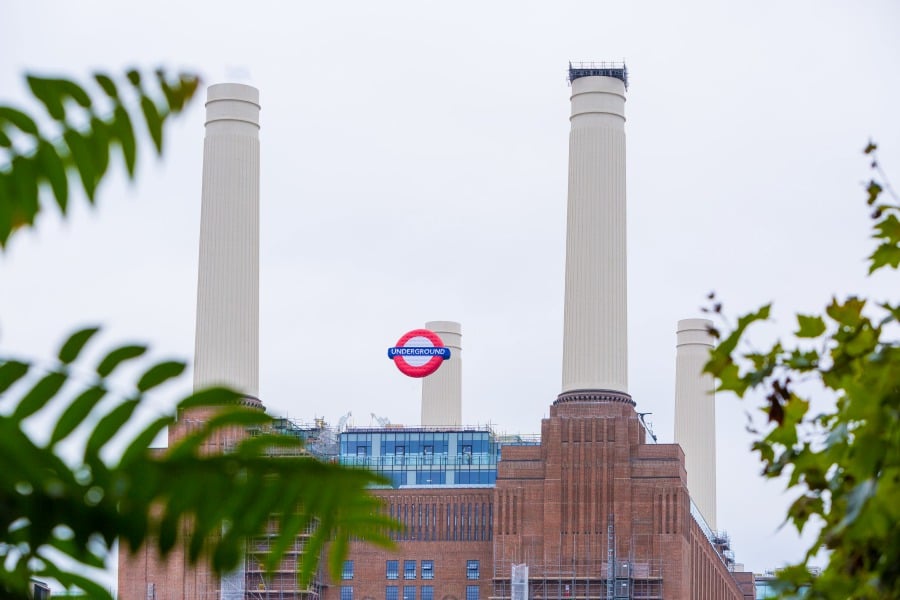
sharen@nst.com.my
The first major expansion to the London Underground network this century, the Northern line extension (NLE), has opened, marking an important milestone in the regeneration of Battersea Power Station (BPS) and the reshaping of central London.
The riverside neighbourhood is redeveloped by a Malaysian consortium comprising S P Setia Bhd (40 per cent), Sime Darby Property (40 per cent), and the Employees Provident Fund (20 per cent).
The former coal-fired Power Station was dormant for decades after it was decommissioned in 1983. The Malaysian consortium won a competitive bid to redevelop the 15-hectare site in 2012 in a deal worth £400 million.
S P Setia and Sime Darby Property are strategic investee companies of Permodalan Nasional Bhd, which together with the Employees Provident Fund owns the commercial assets within the Power Station building.
The £9 billion regeneration project will create 3.5 million square ft of mixed commercial space, coupled with 4,239 new homes and 19 acres of public space.
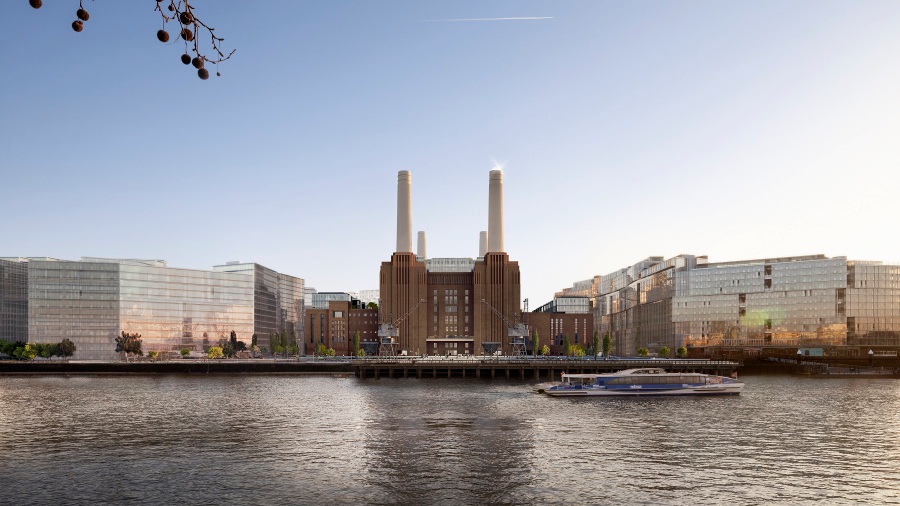
According to a statement by Sime Darby Property, the BPS project has contributed over £300 million to the NLE which runs from Kennington to Battersea Power Station via Nine Elms and has enabled the regeneration of both these areas.
With its very own Zone 1 London Underground station now open, BPS will draw Londoners, international visitors, and workers from across the capital with journey times to the West End and the city takes about 15 minutes, boosting the local economy and creating over 17,000 jobs.
Battersea Project Holding Company chairman Datuk Ahmad Pardas Senin said: "The launch of the Northern line extension is a historic moment in British transport history and we are delighted to have been able to support and contribute to this pivotal infrastructure project, which is set to significantly enhance the connectivity of this part of London."
Datuk Wong Tuck Wai, chairman of Battersea Power Station Development Company (BPSDC) said that this new mode of transport is a gamechanger for Battersea and Nine Elms and undoubtedly makes BPS one of the most well-connected destinations in the capital.
BPSDC chief executive officer Simon Murphy said the launch of the Northern line extension is a major milestone in the regeneration of BPS.
"Improving transport links and connectivity to this area of London has been fundamental to the development from the very beginning, and we are delighted to have played a key role alongside TfL and others in delivering the first major extension to the London Underground this century," he said in the statement.
He said as the company countdown to the Power Station opening its doors to the public next year, he looks forward to welcoming more visitors travelling on the new tube line from across the capital.
Once open to the public next year, BPS will house over 100 shops, bars, and restaurants, as well as unique events and leisure spaces, including the chimney lift experience. The glass elevator will transport visitors 109m up inside one of the Power Station's iconic chimneys before they emerge at the top to enjoy unrivalled 360o views of the capital's skyline.
According to the statement, there is strong progress on Electric Boulevard, a new high street that runs from the south of the Power Station, between the stunning Frank Gehry-designed Prospect Place and Foster + Partners' Battersea Roof Gardens to the new BPS Zone 1 underground station.
Electric Boulevard, which is opening next year will offer a mix of office space, shops, bars and restaurants, a park, a community centre, and a 164-room hotel from art'otel®, the brand's first hotel to open in London.
The rest of the building will be completed in stages throughout the year, with residents moving into the Boiler House and Switch House East in the coming months.
Circus West Village, the first phase of the iconic development, welcomed its first residents in 2017. It is currently home to over 1,500 people.
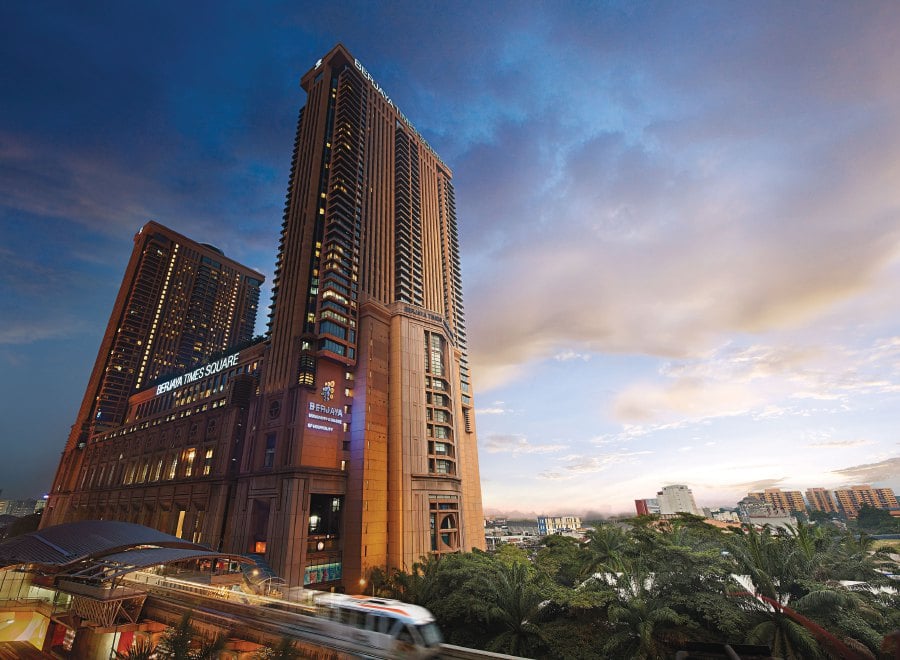
sharen@nst.com.my
Berjaya Land Bhd (BLand) is preparing for a brighter future in the fiscal year that ends June 30, 2022 (FY 2022).
According to a stock exchange filing made yesterday, the board of directors expects the group's business operations to steadily improve in FY 2022, with the projected opening of more businesses.
The main operating businesses of the BLand group are number forecast operations (toto betting operations), motor retailing, property development and investment, and the operations of hotels and resorts.
According to analysts, the group's hotels and resorts division is expected to generate more revenue in the current fiscal year.
Berjaya Property Ireland Ltd, the company's wholly-owned subsidiary, will contribute a significant portion of it, they said.
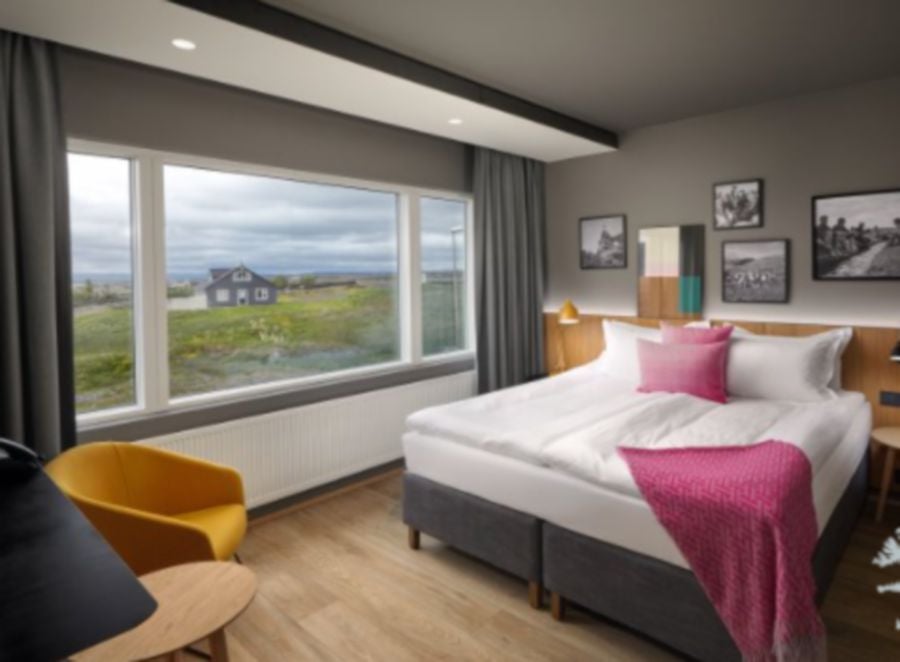
BLand has purchased 100 per cent of Icelandair Hotels ehf through BPIL for US$57.03 (about RM234.11 million) in cash.
With 1,471 keys spread across 14 hotels under several brands, the group has become Iceland's largest hotel operator.
The acquisition, according to BLand, is in keeping with the group's plans for geographic diversification and revenue growth.
Berjaya Corp Bhd (BCorp) chief executive officer Abdul Jalil Abdul Rasheed said in a Twitter post last month that the Iceland hotels have bounced back swiftly as the quarantine limitations imposed by Covid-19 had been lifted.
According to Abdul Jalil, the global hotel industry has been difficult over the past 18 months due to pandemic-related movement limitations.
He said that whilst most of the group's overseas hotels suffer because of the pandemic, the hotels in Iceland are doing better.
Icelandair Hotels' website showed that hotel names under its umbrella comprise Icelandair Hotel, Hilton, Edda, Canopy, Konsulat and Alda, and they cater to various market segments.
BLand, in which BCorp owned a combined direct and indirect stake of 78.629 per cent, operates hotels in Malaysia, Vietnam, Japan, and the UK.
For the 12 months to June 30, 2021 (FY 2021), BLand's net loss increased to RM250.64 million from RM36.84 million in the year before that due to the lockdown limitations.
Its new loss widened despite revenue increasing 4.73 per cent to RM5.4 billion from RM5.16 billion.
In a Bursa filing yesterday, the group attributed the revenue increase to its gaming operations and motor vehicle dealerships.
BLand said it had also completed and handed over a mixed development project in Dong Nai, Vietnam.
The group said that due to continued international border closures and domestic travel restrictions, its hotels and resorts business sector reported decreased revenue from lower average occupancy rates.
According to BLand, the hotels and resorts business categories suffered losses in the 12 months to June 30, 2021, with a bigger share of losses coming from related enterprises and joint ventures.
"The hospitality industry is quite dependent on international tourism and therefore solely reliant on domestic tourism is not sustainable during this pandemic," it said in the filing.
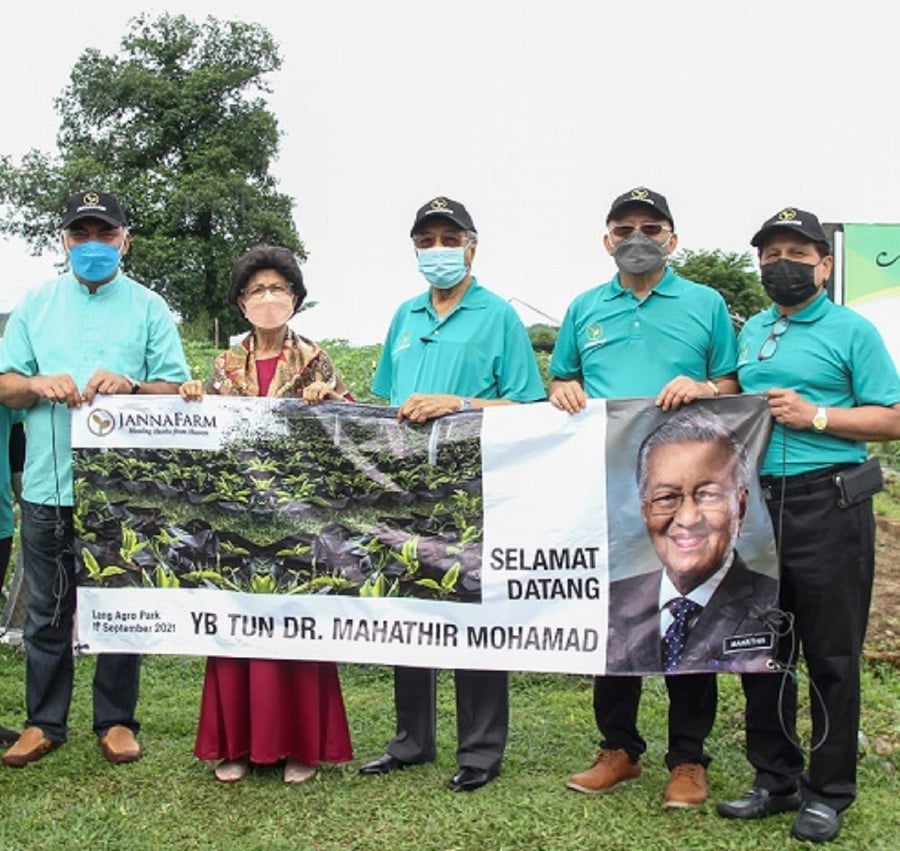
KUALA LUMPUR: Malaysia, which spends hundreds of million ringgit to import spices annually, should encourage the local black ginger industry to enhance exports.
This would also create new jobs for Malaysians, said former Prime Minister Tun Dr Mahathir Mohamad during his visit to the JannaFarm black ginger farm at Lang Agro Park near Kuah, Langkawi last weekend.
Tun Mahathir was on a four-day visit to the island to witness the Langkawi tourism bubble program.
JannaFarm chairman and former Felda director-general Datuk Dr Othman Omar, during his presentation, said Malaysia imported between RM40 billion and RM50 billion of food and food-based products every year.
Hundreds of millions of ringgit are spent to import raw ginger, black ginger and similar herbs and spices for cooking, cosmetics, wellness and medicinal purpose.
Othman said most of the raw black ginger was imported from Thailand and Cambodia.
He claimed that they were more expensive and of lower quality.
"The raw ginger from Thailand and Cambodia are high in toxin content due to the extensive use of chemical pesticides and chemical fertilisers to improve yield. We are engaging with 15,000 local Malaysian ginger farmers to help produce this premium quality Langkawi black ginger strain to be grown organically," he said.
JannaFarm chief executive officer Engku Azhan Fahmi told the New Straits Times that the firm operated black ginger farms in Malaysia based on contract-farming and crowd-farming.
He said the farms used 95 per cent less water with drip-fertigation, zero pesticides with natural pest control, composting for organic fertilisers, booster enzymes and effective microorganisms (EM) to create high-quality rhizomes while conserving the environment.
According to him, black ginger is rich in amino acid, selenium, antioxidants, bioflavonoids and has been commonly used as a traditional treatment for multiple types of illnesses for over 1000 years in India, China, Africa and Southeast Asia.
"Our rhizomes are in the process of being certified organic. Our high-quality rhizomes, extracts, and products are the result of extensive R&D, scientific and clinical studies, and laboratory testing at both domestic and international facilities and institutions.
"There are over 130 scientific research papers done on black ginger alone; some based on laboratory tests done on cancer tissues and animals," he said.
Engku Azhan said a team from Universiti Putra Malaysia had been working on tissue culture experiments to create the best strain for the Langkawi black ginger rhizomes.
"We have tested using a Swiss-patented technology to improve the efficacy of our extract, thus multiplying the potency by up to 75 times, resulting in more rapid effect, increased cellular absorption, enhanced nutrient potency and stability via encapsulation on the molecular scale," he added.
The Swiss company had produced a curcumin-based extract combined with vitamin C as the first natural supplement to be clinically tested for zero pain in Covid-19 patients and proven to improve its symptoms, he said.
Engku Azhan also said JannaFarm was in discussion with an Australian-based laboratory on clinical studies for approval of its active ingredient "5,7-dimetoxiflavone" to be used as an "over-the-counter" prescribed drug.
In the downstream, JannaFarm is working with local and international manufacturers and joint venture partners to build new, innovative and high-end wellness and cosmetics products for the global market.
 |
| Former Prime Minister Tun Dr Mahathir Mohamad |
Current products by Jannafarm include black ginger extracts, ground powder, ZestCafe, ZestCafe Plus and Zestea.
Engku Azhan said a few more products like soap/scrub, health elixir, chocolate and candies would be launched in the next few months.
"We are constantly on the lookout for agents, suppliers and distributors for marketing and distribution to the local and international market," he added.
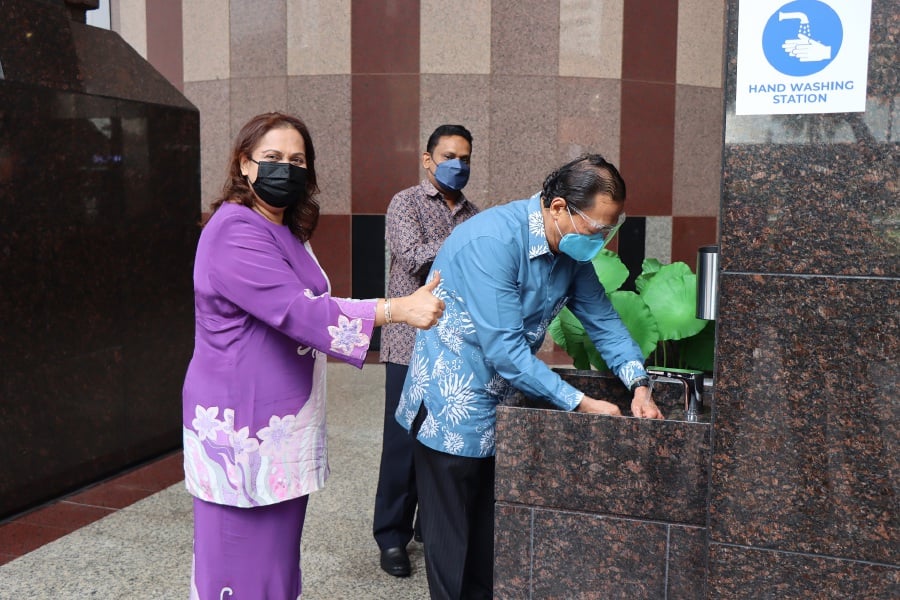
sharen@nst.com.my
Berjaya Group founder Tan Sri Vincent Tan has taken extra steps to ensure that shoppers are secure when shopping at Berjaya Times Square Kuala Lumpur (BTS Mall).
Tan, executive chairman of Berjaya Times Square Sdn Bhd, said with the retail sector resuming business following the easing of restrictions by the National Security Council, BTS Mall wants to make sure that all visitors can shop in peace.
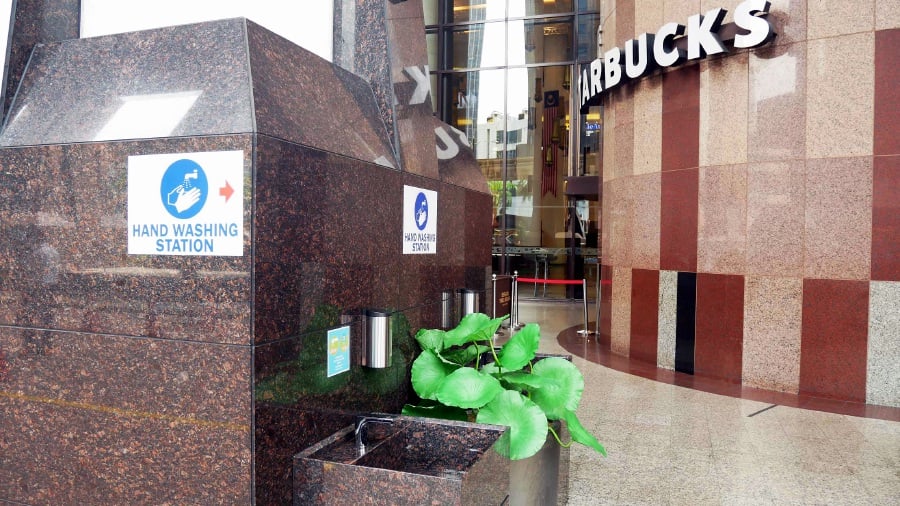
Visitors can wash their hands before entering the mall or after they finish shopping at four handwashing stations that have been set up at the mall's main entrance on the ground floor.
There are auto-closed faucets and auto-dispensed soap dispensers in the washbasin so that users do not have to touch them, Tan said.
He said frequent hand washing with soap and water is one of the best strategies to prevent the spread of the Covid-19 virus.
BTS Mall is possibly the first shopping mall in Malaysia to have handwashing facilities at the entrance.
"Most visitors are reluctant to wash their hands in the restrooms because they are primarily used to answer nature's call. Aside from that, restrooms aren't the most pleasant places to be at. In this regard, the washbasins installed at the external area of the mall will provide convenience and easy access for our shoppers to wash their hands."
Tan added that Berjaya would install more handwashing stations at several other areas within the mall soon.
There are around 3.5 million square feet of retail space in the BTS Mall, making it Malaysia's largest inner-city shopping mall by area. It houses Berjaya Times Square Theme Park – Malaysia's largest indoor theme park with 12 major rides and thematic attractions, Ampang Superbowl – one of the largest bowling centres in the country with 48 lanes, as well as retail outlets, cafes and restaurants.
Tan said the mall continues to adhere to the standard operating procedures set out by the government, which include scanning of the MySejahtera QR code for contact tracing, temperature taking at all entry points, hand sanitising, the mandatory wearing of face masks upon entering the mall, and placing of social distancing markers.

sharen@nst.com.my
Tan Sri Syed Mohd Yusof, a well-known Malaysian businessman, and an investor wants a resurgence in Malaysian tourism to ensure its long-term viability.
He said that despite the reduction of lockdowns, most hotels are still recording occupancy rates below 10 per cent.
Syed Yusof believes that the tourism business may not fully recover from the consequences of Covid-19 for several months.
"Due to the ongoing pandemic, travel restrictions within the country, and the closure of international crossings for an extended period have resulted in very low occupancy levels for most hotels in the city centre," according to Syed Yusof, also known as "Jojo".
"We are in desperate need of assistance in order to rebuild and emerge from this current situation as quickly as possible. To begin, the government could open the Singapore border, which would have a significant positive impact on hotel occupancy, particularly in Melaka and Johor," he told NST Property.
Syed Yusof said he was pleased that the government had finally decided to allow tourism to Langkawi.
A domestic travel bubble launched for persons who have been fully vaccinated against Covid-19 was opened in Langkawi on September 16, welcoming 3,200 guests.
Syed Yusof asserted that this is good news for the local tourism industry, particularly hotel and resort operators in Langkawi.
"The arrival of tourists will increase hotel occupancy in Langkawi. Certain boutique hotels may be able to reach occupancy rates of up to 80 per cent," he said.
Syed Yusof said that because of low occupancy, hotel owners and operators have greater expenses than income.
"As owners, we have to top up monthly just to meet the costs so that we could still operate," he said.
He predicts that the current state of affairs will continue until travel restrictions and lockdown measures are lifted worldwide.
According to the Malaysian Association of Hotels (MAH), the country's hotel industry has lost RM9 billion in income in the first seven to eight months of this year.
If no interstate travel is allowed by December 31, 2021, it might reach RM10 billion.
The industry reportedly suffered an RM6.5 billion sales loss in 2012.
A total of 120 hotels have shuttered, either temporarily or permanently, according to MAH, and this number could rise if the economy continues to stagnant.
The Covid-19 pandemic, according to MAH president Datuk N Subramaniam, has crippled the travel and tourism industry, including tour operators and hotels alike.
When "Visit Malaysia 2020" was announced last year, hoteliers anticipated a significant increase in revenue.
Malaysia had budgeted for 30 million tourists and earnings of $21.5 billion. However, over 3.5 million people who worked in tourism were affected because of the virus, which put a damper on things.
Syed Yusof urged the government to reexamine the moratorium, with low or no interest for businesses, as a method to assist hoteliers.
He also called on national utility company Tenaga Nasional Bhd to reduce by up to 50 per cent of the monthly energy bill.
"This will make it easier for companies to function in the current environment. Since the hotel rooms are empty, there should be reductions in the assessment tax and quit rent. When circumstances were good, the industry provided the government with more than RM80 million in revenue merely from collecting the assessment rate and quit rent. It's high time we get some help," he said.
According to Syed Yusof, the food and beverage (F&B) industry is in a similar predicament, with operators barely able to stay afloat.
Despite additional states entering Phase 2 of the movement control order, the F&B industry has remained slow because consumers are still wary about eating out, he said.
"Can you image what we are facing when it's hard to break even or even earn a profit?" he exclaimed.
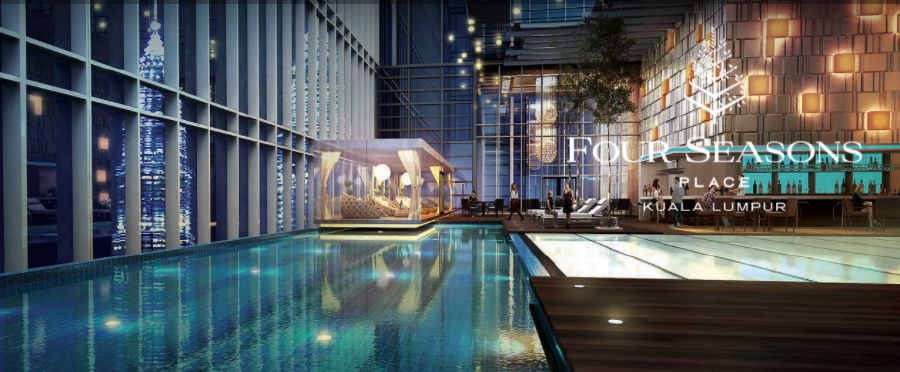
Syed Yusof is a successful businessman with over 40 years of expertise in a wide range of industries, including real estate development, construction, media, entertainment, hotel management, food & beverage, banking, and information technology.
Hard Rock Cafe, the Concorde Hotel, and Nobu are just a few of the respected businesses and brands he's established in the country.
Hard Rock Cafe and Nobu have opened in Malaysia thanks to his investments in the local business community through boutique developer Venus Assets Sdn Bhd, of which he is the chairman.
Four Seasons Place, Kuala Lumpur, next to the Petronas Twin Towers, was opened in 2018 by Venues Assets, whose controlling shareholders are Syed Yusof, the Sultan of Selangor Sultan Sharafuddin Idris, Datuk Ong Beng Seng, and Datuk David Ban.
The Four Seasons Place is a 65-storey building comprising the five-star Four Seasons Hotel Kuala Lumpur, Four Seasons private residences with 242 residential units, and Shoppes @ Four Seasons Place.
Currently, he sits on the Board of several public listed companies.
By Sharen Kaur - Published in NST Property, September 16, 2021
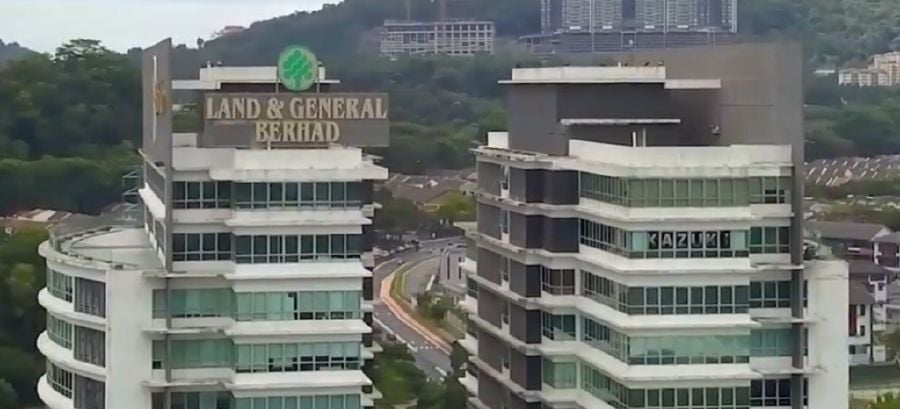
sharen@nst.com.my
Land & General Bhd is starting the redevelopment of the Sri Damansara clubhouse land in Bandar Sri Damansara, according to its managing director Low Gay Teck.
Some 732 apartments will be built on the 5.7-hectare site. The estimated selling price is between RM400,000 to RM700,000, he said.
Low said the project is expected to be launched by the second quarter of 2022.
He is bullish on the take-up rate as the project is located in a mature township.
L&G is the master developer of the 485.82ha Bandar Sri Damansara township, developed since the 1990s.
The two-storey clubhouse with a vast golf driving range was developed by L&G in 1995 and was one of the lifestyle amenities built for residents.
L&G planned to redevelop the site for more than five years to unlock its potential value as the clubhouse sits on a prime piece of commercial land.
Analysts have said previously that the redevelopment of the clubhouse land is set to fetch lucrative returns given its low land cost at RM2.40 per square ft.
The developer has diversified beyond the affluent township into other areas in Klang Valley, where it has about 323.9ha of development land, with a gross development value (GDV) of RM9 billion.
A virtual press conference held after the group's shareholders' meeting yesterday revealed that these large tracts of land in Klang Valley would take around 15 years to develop fully.
L&G has several ongoing projects, namely Astoria Ampang Phase 1 and Sena Parc Phase 1A and Phase 1C.
It plans to launch Phase 2 of Astoria Ampang, comprising 506 serviced apartments and Phase 1D of Sena Parc, featuring 162 double-storey terraced houses between now and March 31, next year.
Low said the GDV for the two phases, combined with Phase 1C of Sena Parc, will be more than RM450 million.
Phase 1C of Sena Parc was launched in May 2021.
Low said that as at August 31, 2021, Astoria Ampang Phase 1 had achieved a 77 per cent take-up rate.
The take-up rate for Sena Parc Phase 1A and Phase 1C is 97 per cent and 13 per cent, he said.
L&G is also developing Damansara Seresta in Bandar Sri Damansara, and the current take-up rate for the ongoing phase is 64 per cent.
"During the lockdown period, there were many potential buyers who were keen to buy but unable to do so. Nonetheless, we saw a recovery in the number of footfall visiting our sales gallery in the past weeks, and that was a promising sign," Low said.
By Sharen Kaur - Published in NST Property, September 16, 2021
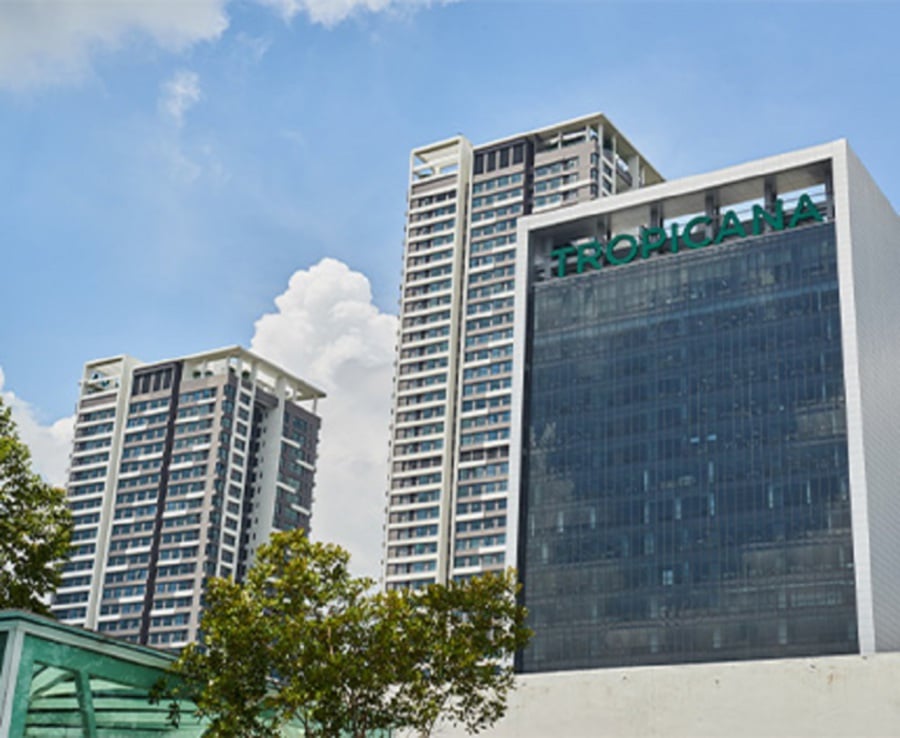
Tropicana Corp Bhd has issued RM270 million worth of perpetual sukuk, which was given an AIS rating and a stable outlook by the Malaysian Rating Corporation Bhd (MARC).
The sukuk is part of an RM2 billion perpetual Sukuk programme, which is based on the Shariah principle of Musharakah, Tropicana said in a stock exchange filing yesterday.
The sukuk will be mainly used to refinance Tropicana's existing borrowings and to finance the group's working capital requirement.
As at end-March 2021, borrowings stood at RM3.7 billion.
In the first quarter of 2021, Tropicana recorded Year-on-Year increases in revenue and operating profit to RM240.5 million and RM54 million, attributable to higher progress billings.
Tropicana recorded higher sales and revenue from its current developments across its townships, such as Tropicana Miyu condominiums in Petaling Jaya and Shoppes & Residences (South), a mixed development comprising retail lots, and serviced apartments in Tropicana Metropark, Subang Jaya.
It also achieved good take-up for Edelweiss SOFO and serviced residences, the fifth and final tower of its signature Tropicana Gardens development.
The group reportedly has an ongoing gross development value of around RM4 billion, with most of its projects located in the Klang Valley.
Tropicana's established market position in the domestic property industry, coupled with large unbilled sales of about RM1.1 billion that provides earnings visibility through 2023, remain key rating drivers.
By Sharen Kaur - Published in NST Property, September 10, 2021
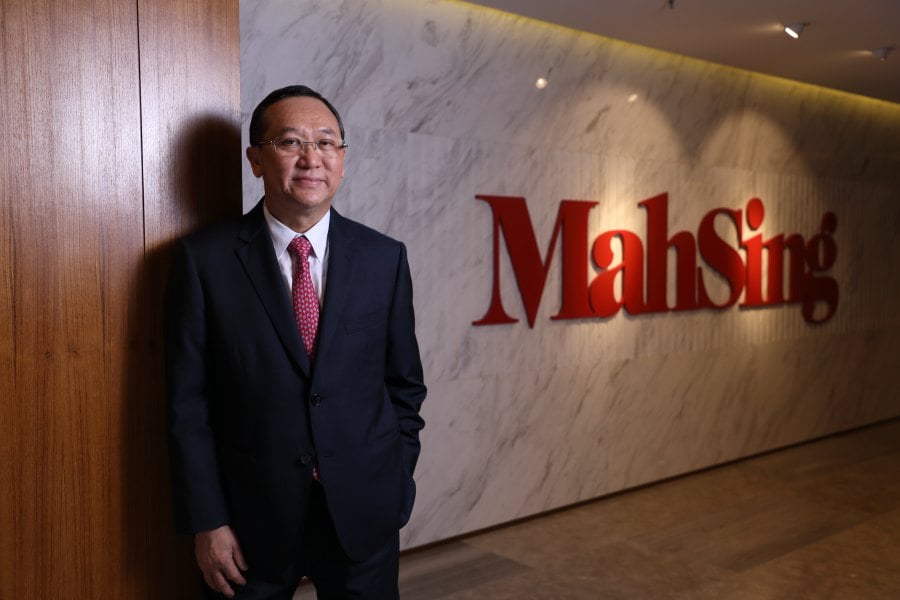
sharen@nst.com.my
Mah Sing Group Bhd looks forward to a multi-pronged approach in which government, industry players, and community members work together to achieve the National Recovery Plan (NRP) targets,
Business resilience is essential to rebuild and reset the economy, according to the company's founder and managing director Tan Sri Leong Hoy Kum.
The transition of Kuala Lumpur, Selangor and Putrajaya into Phase 2 of the NRP, and the decision to allow housing galleries to operate under Phase 1 effective today are both timely, he said.
"For individuals who are fully vaccinated, more activities such as eating at home or travelling within the same state will be allowed, which will help strike a balance between health protection and livelihoods as we go through the NRP and embrace the new norm," he explained.
Some RM530 billion worth of aid and economic stimulus packages have been issued by the government since 2020, completing eight well-rounded aid packages. According to Leong, this has helped cushion the economic impact to a certain degree caused by the pandemic.
"We appreciate the government's efforts to meet the needs of the people and companies at this difficult time," he said.
A recent analysis by KAF Equities on the Malaysian property market revealed that Klang Valley typically accounts for roughly one-third of total residential property transaction units and about half of the total residential property transaction value in Malaysia.
"When the government transitions Klang Valley into Phase 2 and opens up additional industries, we believe it will help reinvigorate the local economy over time. The widespread influence of economic stability will also encourage these areas' real estate markets," he said.
According to the Covid-19 Vaccine Supply Access Guarantee Special Committee (JKJAV), around 70.5 per cent of Malaysia's adult population have been fully vaccinated, and 89.5 per cent have received at least one dose of vaccine as at September 8, 2021.
The majority of Mah Sing's employees, according to Leong, have been immunised to the fullest extent possible.
"To ensure a safe environment for our personnel and visitors as they resume their usual lifestyle, our property sales galleries have adopted severe hygiene protocols, distancing requirements, and standard operating procedures," Leong said.
By Sharen Kaur - Published in NST Property on August 24, 2021

sharen@nst.com.my
The Malaysian Association of Hotels (MAH) estimates that the local hotel industry has lost around RM9 billion in revenues in the first seven to eight months of this year.
This could exceed RM10 billion by December 31, 2021, if interstate travel is still not allowed.
Last year, the industry lost around RM6.5 billion in revenues.
According to MAH, about 120 hotels have closed down either temporarily or permanently up to now and this may increase if the economic situation remains stagnant.
The tourism industry is undoubtedly one of the most impacted by the Covid-19 pandemic, with effects crippling travel and tour operators and hotels alike, said MAH president Datuk N Subramaniam.
"Acknowledging the hardship of the people in the industry, MAH since the early days of the pandemic has been lobbying for support and assistance from the government, including various initiatives to boost domestic tourism. It is unfortunate, however, given the currently extended lockdown and travel restrictions imposed, the hotel industry is still unable to generate sufficient income to sustain, directly impacting the livelihoods of its workforce," he said in a statement.
MAH has formed a Tourism Recovery Committee comprising industry experts to formulate strategies that would drive the impending recovery of the tourism industry.
Apart from working with the Ministry of Tourism, Arts & Culture and Tourism Malaysia, the committee is working on marketing and promotion projects both for domestic and international markets.
To further support the industry, the association launched its MAH Cares programme, allocating RM200,000 worth of food aid through its State Chapters, distributing essentials and food supplies to those in need in the hotel industry.
Subramaniam said the initiative will benefit thousands of families with necessities and essential items.
This initiative will also raise awareness of the need of the industry, and encourage both public and private sectors to support the tourism and hotel industry of Malaysia, he said.
One of the main sponsors for the MAH Cares programme thus far is Yeo Hiap Seng, a household food and beverage brand.
By Sharen Kaur -Published in NST Property, August 30, 2021
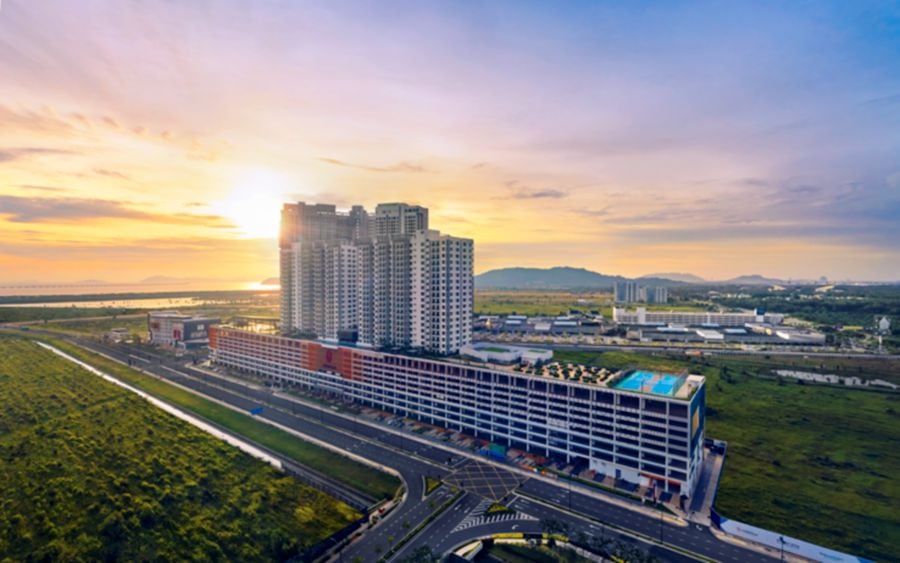
Paramount Corp Bhd hopes to sustain the strong sales momentum with speedier sales conversion and project approvals as lockdown restrictions ease, says its group chief executive officer Jeffrey Chew.
He, however, warned that the property market will be weighed down by continued economic uncertainties caused by the prolonged pandemic situation which could result in cautious household spending, reduced business expenditure, and a weakened employment market.
Overall, Chew cautioned that the business environment is expected to remain challenging for the rest of 2021.
Having said that he believes that the low-interest-rate environment and the stamp duty exemption under the homeownership campaign will remain crucial to incentivise property purchases.
With that in mind, Paramount said its property division has lined up a few projects for the second half of this year, namely The Atrium and Arinna Kemuning Utama, it said in a statement last week.
The Atrium is a low-density development located close to Kuala Lumpur's embassy row, along Jalan Ampang and Jalan Ampang Hilir, with a gross development value (GDV) of RM202 million.
The 19-storey block will feature 241 units of apartment, with a built-up area of 556 sq ft to 1,227 sq ft. The launch price is RM563,000.
Arinna Kemuning Utama is a low-density smart home project located in Shah Alam.
The project offers 356 units of condominiums housed within two towers, with built-ups of 1,009 sq ft and 1,525 sq ft.
Paramount posted a net profit of RM1.62 million in the second quarter ended June 30, 2021 (2Q FY21) compared to a net loss of RM4.01 million a year ago.
The group attributed the improved profitability to the low base of last year, coupled with higher revenue due to containment measures implemented to curb the spread of Covid-19.
Its revenue for the quarter almost doubled to RM127.45 million from RM64.2 million a year ago.
For the first half (1H FY21), its net profit was RM3.92 million compared with RM462.63 million boosted by a divestment gain a year ago. Its six-month revenue rose almost 50 per cent to RM279.26 million from RM186.31 million previously.
Paramount said for 1H FY21, it achieved property sales of RM309 million, which was 62 per cent higher against RM191 million in the corresponding period last year.
The group achieved higher property sales despite having launched fewer property units in 1H FY21 (217 units) as compared with the launches in 1H FY20 (548 units).
The property division achieved higher sales from projects such as Bukit Banyan in Kedah, ATWATER in Selangor, and Utropolis Batu Kawan in Penang.
Paramount has unbilled sales of RM1.03 billion as of June 30, 2021, providing some form of visibility on its cash flow in the near term. However, it said that the pace at which the unbilled sales can be converted into billings would depend on the construction progress of the projects.
By Sharen Kaur - Published ni NST Property, September 1, 2021 10
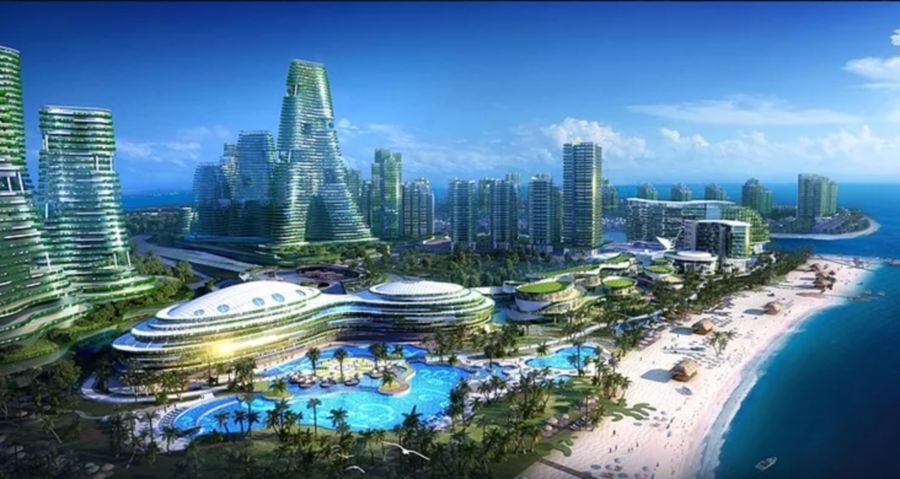
The country's largest foreign real estate developer, Country Garden Holdings Co Ltd, is scaling back its operations in Malaysia as sales of its US$100 billion Forest City project in Johor continue to decline because of the ongoing Covid-19 outbreak.
Country Garden has reduced its employment and sales team in Malaysia by two-thirds in the last two years, according to the South China Morning Post (SCMP), a Hong Kong-based news organisation.
SCMP stated, citing unidentified sources that included employees, that Country Garden had reduced its Malaysia headcount to 500 as of June, following three waves of layoffs over the previous 18 months, and sold less than ten properties in Forest City the same period.
Another round is expected, according to SCMP, with offshore staff being recalled to China either to fill gaps in Country Garden's home branch or to leave the company if they refuse.
Country Garden's spokesman in Hong Kong has not responded to SCMP's inquiries, according to SCMP.
Country Garden Pacificview (CGPV) Sdn Bhd authorities could not be reached for comment at the time of publication by NST Property.
CGPV is the master developer for Forest City and a real estate joint venture between Esplanade Danga 88 Sdn. Bhd and Country Garden. Esplanade Danga 88, an associate company of Kumpulan Prasarana Kerajaan Johor owns 40 per cent of CGPV while the remaining 60 per cent is owned by Country Garden.
Forest City, which will be built on four reclaimed islands and would cover 30 square kilometres (eight times the size of New York's Central Park) when completed in 2035, is expected to house 700,000 people.
The project is meant to be Country Garden's most significant overseas project.
The retrenchments, according to SCMP, are the result of a "triple whammy" that began in 2017 when China's government lowered the tax on offshore remittances by Chinese citizens to prevent capital flight, followed by deteriorating relations between China and Malaysia under former Prime Minister Tun Dr. Mahathir Mohamad.
Country Garden was forced to close all of its Forest City sales centres in China in early 2017 as a result of this.
Property sales in Forest City plummeted due to the epidemic of 2020 and the ensuing lockdowns and travel bans. It worsened in August of last year with the suspension of the Malaysia My Second Home Program, which provided 10-year visas to foreigners who purchased mid-to-high-end residential properties in Malaysia.
Country Garden estimated annual sales of 18 billion yuan (US$2.8 billion), or 11 per cent of Country Garden's total revenue in 2016, and pledged to invest US$100 billion (RM414.65 billion now) in Forest City over the next two decades.
In 2013, the company reclaimed its first square kilometre of land from the Johor Strait.
After eight years of development, only one of the four islands has been constructed, with condominiums, the five-star Forest City Marina Hotel, an international school, an industrialised building systems (IBS) factory, and a commercial area.
At the end of July, Country Garden reported that 10,953 Forest City residents had gotten their keys.